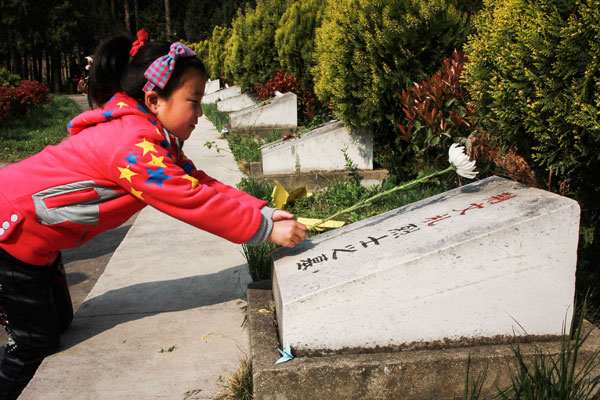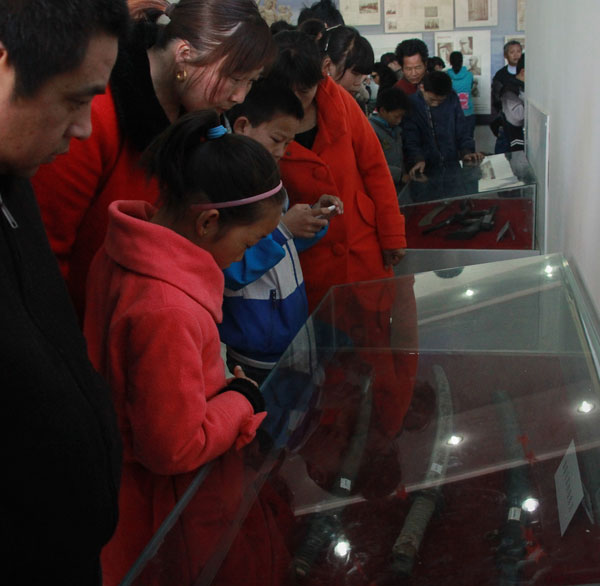Lost in obscurity
Walking through the cemetery gates, the first thing that catches the visitor's eye is a memorial tower that dominates the scene, soaring out of a background of green pines and verdant cypresses. Directly behind the tower, which stands a precise 19.42 meters to mark the year of the battle, lie the bodies of the Chinese troops. Each of the white-marble headstones bears the name of the fallen soldier, and the characters etched into the stone are dyed a deep red, the color of blood. The remains of the Japanese soldiers lie a short distance to the northwest.
 |
|
A girl places a flower on the gravestone of a Chinese soldier. |
Built in 1943, the cemetery has gone unnoticed for much of its existence. Although the locals are aware of its importance, many in the wider community have never heard of the place, which seems lost in obscurity, especially the mass grave of the Japanese soldiers.
"No one knows their names. No one has ever come back to look for them," said Zhu Yimin, the cemetery's director. "Despite the atrocities the Japanese committed against civilians, the Chinese people repaid evil with good, and buried the bodies of these invaders," he said.
 |
|
Residents of Sihong county visit the local museum of the War of Resistance against Japanese Aggression. |
In a memoir written for a journal of wartime stories published by the Sihong New Fourth Army Research Society, Wang Honglu, a survivor of the battle, recalled: "The Japanese finally made a slapdash withdrawal without taking away the remains of their dead troops. I noticed that each body was missing an arm. For me, it confirmed the old saying that if the 'Japanese devils' can't take away their war dead, they will chop an arm off each of the bodies, and take them away instead."
The 18-hour battle, in which some 400 Chinese troops faced about 1,500 Japanese soldiers, was a crucial event because it consolidated and developed the anti-Japanese base in northern Jiangsu. For some of the older generation, the anger prompted by wartime atrocities still hasn't abated.
"Those Japanese soldiers were murderers and war criminals who invaded China, but at the same time, they were also the victims of the imperialists and the warmongers in Japan," said Li Songke, an expert with the New Fourth Army Research Society in Sihong.
"In this regard, the Chinese nation showed huge heart. It buried the invaders' bodies and let them lie beside the Chinese who died because of them," said the 74-year-old historian.
"However, Japan doesn't appreciate the respect and kindness shown by the Chinese people. It's shameful that Japan still won't look at history honestly. That country shows no remorse," he said.
Li said the mass grave is "ironclad evidence" of Japan's invasion of China, an invasion that successive Japanese governments have all but refused to acknowledge.
Members of a Japanese anti-war alliance erected a gravestone in front of the mass grave in 1943, or "Showa Year 18".
Written in Japanese, the epitaph reads: "It is a sorrowful fact that 13 Japanese soldiers, including a platoon leader, bid farewell to their parents and wives forever on Dec 10, 1942. China's New Fourth Army buried the remains. It is a demonstration of Japan's invasion of China, and proof of the militarist and capitalistic expediencies of Japan."
